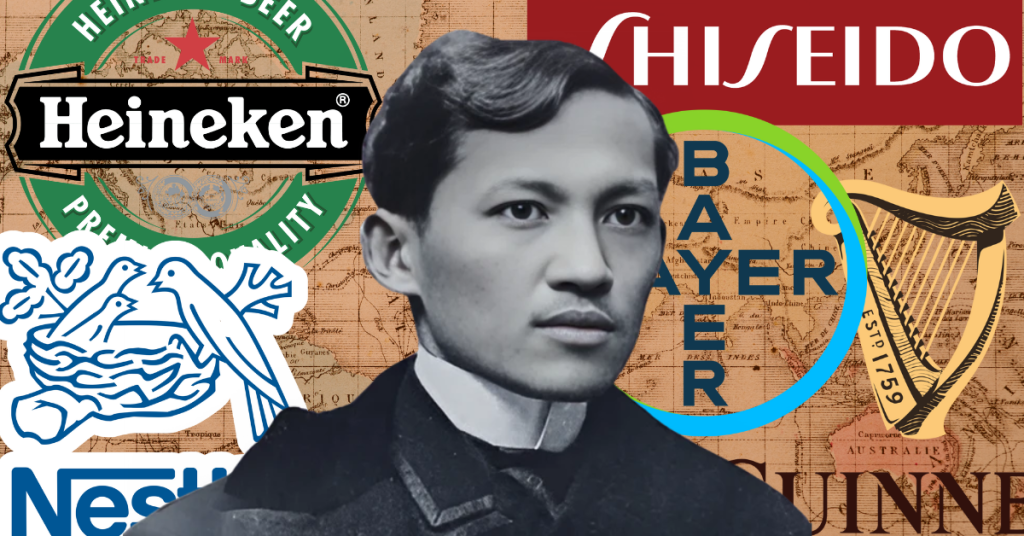When we think of national hero Jose Rizal, we imagine his books, his travels, and his fight for Filipino dignity. But Rizal also lived at a time when some of today’s biggest global brands were just starting out. From Europe to Asia, the products he likely saw on his journeys are still part of the modern marketplace.
Rizal’s story reminds us that history and commerce are often intertwined. The brands he may have encountered in the late 19th century—whether in Madrid, Heidelberg, Paris, or Tokyo—are proof of how some companies not only survive but thrive across centuries.
Nestlé (Founded 1867, Switzerland)
In 1886, Rizal studied medicine in Germany, right around the time Nestlé was already a household name in Europe. Founded by Henri Nestlé, the company introduced infant cereal as its first product. By Rizal’s day, Nestlé’s condensed milk and powdered products were gaining popularity across Europe.
Fast forward to today, Nestlé has grown into the world’s largest food and beverage company, with over 2,000 brands in 186 countries. Its endurance shows how innovation—shifting from condensed milk to coffee, bottled water, and plant-based food—can keep a brand relevant for over 150 years.
Heineken (Founded 1864, Netherlands)
Beer was already a staple in Europe when Rizal traveled there, and Heineken was among the rising stars. Gerard Adriaan Heineken opened his first brewery in Amsterdam in 1864. By the 1870s, Heineken beer was being exported to Paris, which Rizal frequented.
Today, Heineken is one of the most recognizable beer brands worldwide. Its success lies in balancing tradition—still brewed with its signature yeast since 1886—with aggressive global expansion.
Guinness (Founded 1759, Ireland)
Though already more than a century old in Rizal’s time, Guinness was a global symbol of Irish brewing by the 1880s. While there is no record of Rizal drinking it, the brand was widely available in Europe and could have easily crossed his path in London or Paris.
Guinness survived wars, economic downturns, and shifting consumer tastes by doubling down on heritage and branding. Its iconic harp logo and focus on quality brewing have allowed it to remain a cultural and commercial powerhouse.
Bayer (Founded 1863, Germany)
During Rizal’s time in Heidelberg in 1886, Bayer was still a young German chemical company. Just a few years later, in 1899, Bayer trademarked aspirin, one of the most revolutionary drugs in history.
For Rizal, who was studying ophthalmology and medicine, companies like Bayer represented the cutting edge of science. Today, Bayer is a global pharmaceutical giant, known for everything from healthcare to agricultural solutions. Its longevity proves how continuous innovation in science and medicine can build an enduring brand.
Shiseido (Founded 1872, Japan)
Rizal visited Japan in 1888, where he could have come across Shiseido, founded just 16 years earlier by Arinobu Fukuhara, a former pharmacist to the Imperial Japanese Navy. Shiseido was Japan’s first Western-style pharmacy, later expanding into cosmetics.
Today, Shiseido is one of the oldest and largest beauty companies in the world, a symbol of Japanese craftsmanship blended with modern marketing. Its story highlights how Asian brands also had global ambitions early on.
Lessons for Entrepreneurs and Investors
These brands survived because they understood three things Rizal himself valued: adaptability, education, and vision.
Adaptability: Nestlé pivoted from infant food to coffee and global nutrition.
Education and Science: Bayer leveraged chemistry to produce medicines that changed the world.
Vision and Global Reach: Heineken and Guinness expanded far beyond their European roots to become global icons.
Just as Rizal believed in lifelong learning and resilience, these brands reinvented themselves through crises, wars, and economic shifts. They remind us that survival in business is less about where you start and more about how you evolve.
Why This Matters Today
For modern entrepreneurs and investors, Rizal’s time offers a perspective: some of the products we consume daily were already shaping societies more than a century ago. These brands have stood the test of time not by accident but by deliberate choices in innovation, branding, and expansion.
The next time you sip a Heineken, open a Nestlé product, or use a Bayer medicine, remember: Rizal may have seen these very brands in their infancy. Their survival is a lesson in longevity—and a reminder that businesses built with vision can transcend generations.
![]()



